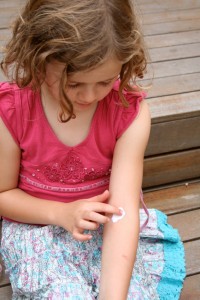 More than 30 million Americans have eczema, a skin condition that causes dry, red, extremely itchy skin. Eczema in children often starts before the age of 5 and can negatively impact children in many ways, including not being able to sleep and lacking focus in school or social situations because of frequent scratching.
More than 30 million Americans have eczema, a skin condition that causes dry, red, extremely itchy skin. Eczema in children often starts before the age of 5 and can negatively impact children in many ways, including not being able to sleep and lacking focus in school or social situations because of frequent scratching.
I see many patients every week who suffer from eczema and other skin conditions. These patients and their parents often come to clinic with ideas about what causes these skin conditions and how to treat them. Below, I’ve debunked three common myths about eczema that we hear at Seattle Children’s Hospital on a regular basis.
Myth 1: Eczema is always caused by allergens
The exact causes of eczema are unknown. It’s often associated with allergies, but is rarely caused by allergies alone. Don’t eliminate foods and drinks from your child’s diet without guidance from a doctor. Changing what your child eats and drinks doesn’t usually help alleviate eczema symptoms.
Eczema runs in families, but parents should not blame themselves for anything they did or didn’t do.
Myth 2: It is bad to regularly bathe children who have eczema
How often you bathe your child with eczema isn’t as important as using warm (rather than hot) water, moisturizing afterward and minimizing the amount of fragranced soaps, bubble baths and other potential irritants that go into your child’s bath water. Another important factor to consider is how long you bathe your child. Use their fingertips as a timer — if they are in the bath long enough for them to look like a raisin, then end bath time. Apply a thick moisturizer immediately after baths to keep the skin hydrated. In general, look for unscented bath, body and laundry products.
Myth 3: Eczema doesn’t need treatment because children will just grow out of it
Sometimes children grow out of eczema, but sometimes they don’t. There are varying severities of the condition, but it can become a bigger problem if a child’s scratching causes infections and open wounds. Parents should help their child with eczema minimize discomfort and should see a doctor if it’s interfering with their child’s regular routine.
The key to keeping your child comfortable during eczema flare ups is ensuring their skin is properly moisturized. As we head into the colder, drier months it’s important to regularly apply moisturizing ointments, lotions or creams to your child’s skin and encourage them to drink plenty of water, which also adds moisture to the skin.
Dr. Robert Sidbury is the division chief of Dermatology at Seattle Children’s Hospital.

